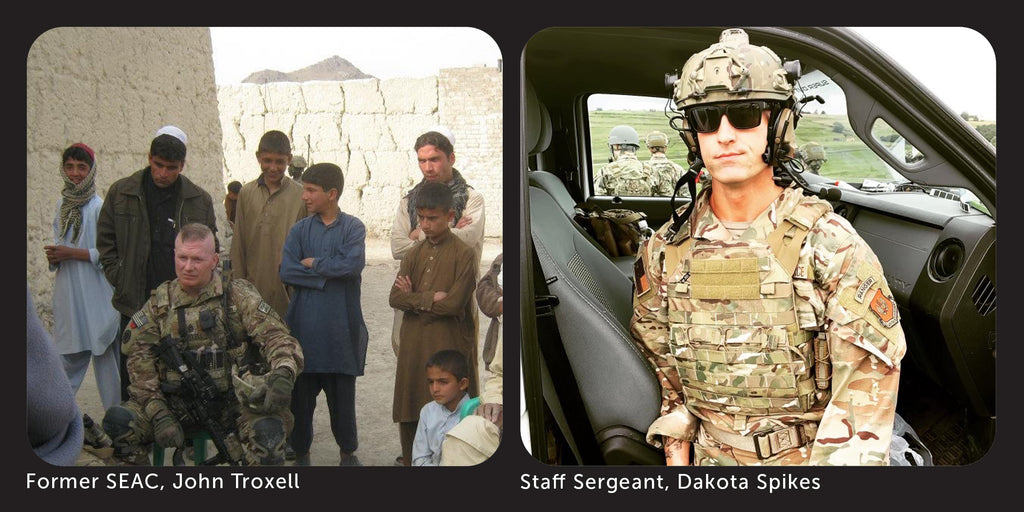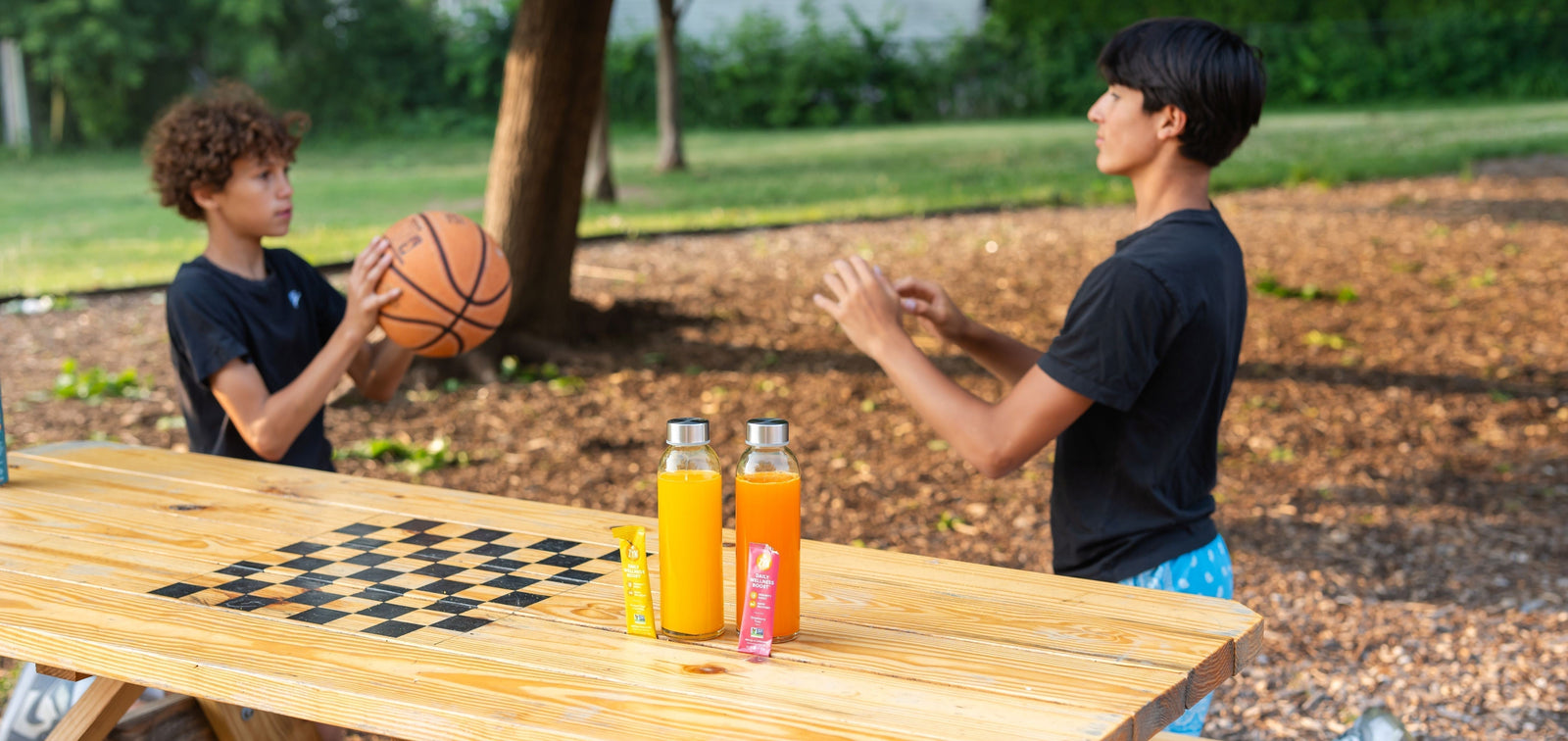Written by Hannah Mladenovich
The month of May is a time for appreciation and reflection for those who gave the ultimate sacrifice. Each day the men and women of this country continue to put their lives on the line for the freedom of others. This venture is extremely taxing in more ways than one, and often gets forgotten or misunderstood. Many of us know someone who is currently serving, has served, or is planning to serve. These individuals are known to be courageous, strong, and motivated, but often their job comes with personal sacrifices.
There is no easy way to understand the emotional, physical, and mental toll that being in the military can take on a person. Starting the conversations and learning how to understand, support, and care for those who are serving can be extremely helpful for our service members.
We interviewed former Senior Enlisted Advisor to the Chairman of the Joint Chiefs of Staff (SEAC), John Troxell and active-duty Staff Sergeant Dakota Spikes to discuss their experiences within the military. During this discussion, we asked both men a series of questions about their experiences and how they best manage their emotional, mental, and physical health during times of stress and inconsistencies.
Q: Brief Introductions: Title, Rank, About Your Position Within the Military:
John Troxell: “My name is John Wayne Troxell and I retired as the Senior Enlisted Advisor to the Chairman of the Joint Chiefs of Staff, the senior noncommissioned officer in the United States military. I served one month shy of 38 years and I served in the United States Army. I was a reconnaissance soldier and I served 5 different combat tours beginning with the combat parachute assault into Panama in 1989, Desert Shield and Desert Storm a year after, and then two tours in Operation Iraqi Freedom, and Operation Enduring Freedom in Afghanistan.”
Dakota Spikes: “My name is Dakota Spikes and I am active-duty Air Force. I have been in for about 6 years and some change. I am in the Security Forces, so Military Police. The job that I am currently doing is not what a lot of people would think in my career field. We are a Contingency Response Group, an Airborne team. We jump into hostile environments and we set up an LSA (Living Support Area) that serves as a FOB (Forward Operating Base) on a flight line that we set up to conduct operations for getting planes in, gearing people in, things of that nature. We provide defense for that area since there are no barriers, fences, or anything that further protects it.
In addition to that, I have also completed U.S. Army Ranger School, U.S. Army Airborne, U.S. Army Air Assault, as well as Advanced Designated Marksman, and the Special Reaction Team course. I also run the Ranger Assessment and Prep Course for all of the United States Air Force in Europe, and I will be attending the U.S. Army Sniper Course during the summer.”

Q: How Do You Care For Your Body During Various Deployments and Inconsistent Schedules?
John Troxell: “I learned to listen to my body. Fitness has always been something that I have been about, but I didn’t focus on putting the whole package together in terms of looking for nutrition, sleep, and things of that nature. Over the years, I learned that in order to be best effective for what I was expected to do in combat, I not only needed to train like a tactical athlete, but I had to sleep, eat right, and nourish my body properly. I had to lead by example through my fitness, nutrition, and rest to be best prepared, as well as influencing my subordinates to be the same way.”
Dakota Spikes: “It is really hard for us since we are pulling 12-hour shifts. So, I guess my priority is trying to get as much rest as I can, when I can, and getting enough food in me. I definitely try to work out if we are afforded the opportunity to do so. We can stay for 45-60 days, so it is kind of hard with our schedule when we go out the door, but trying to do little things here and there helps. If we have a DFAC (Dining Facility/Cafeteria) we can replenish ourselves there, but most of the time it is MREs (Meal, Ready-to-Eat). So, the main importance is trying to do what we can, when we can, when we are not working."
Q: How Do You Prioritize Your Mental Health During Times of Extreme Stress?
John Troxell:“I didn’t. I was in denial for many years. I thought that as a Command Sergeant Major, I was supposed to be an angry dude all of the time. My first combat deployment in Panama we lost our first soldier within an hour of the combat drop, in total 5 young men that were associated with my division, unfortunately lost their lives. I didn’t realize then the impact that had on me because when I got back I had to immediately turn around because we had another crisis on our hands in Iraq. Through the years, I just kept saying that I didn’t have problems with my mental health and that I just needed to suck it up and drive on.
It was about a year before retiring that I came home and spoke with my wife and she said that the first thing I needed to do to plan for that retirement was to see somebody. I went to see a mental health specialist to appease my wife, but when I got in there, I realized how much pent up rage and how hyper-vigilant I was with everything. I have been in therapy ever since, and it has made me a better father, better husband, better grandfather, a better employee, but most importantly– I am not that angry old dude that I used to be. If I had to do it all over again, I would have prioritized my mental health a lot sooner because I didn’t realize how much of a huge part of overall performance the mental and emotional aspect was.”
Dakota Spikes:“I try to just stay focused on the job. Working with the people that I do, we are already a pretty close group, so being able to talk to them and get our minds off of what is going on helps. We talk about life, our families, and things like that. Having a conversation about something other than work helps with my mental health, personally. Making sure everyone else is okay and staying positive helps me feel better as well. I am usually a positive person as it is, so it doesn't take a lot for me to remain that way.”

Q: What Kind of Support Do You Need From Your Civilian Family Members, Spouse, Friends, etc.?
John Troxell:“I think the good thing about the military is that it is inherent in what you do that you build this brotherhood and sisterhood. Obviously my family and civilian friends all supported me throughout my 38-year career and were proud of me especially when I rose to the top of the enlisted ranks, but I think the way you build that camaraderie and cohesion within the military–that is the most important thing.”
Dakota Spikes:“I guess just having a conversation every now and then, whenever I can get a hold of my family, boosts my spirits a lot. As I said, I am usually a positive person so I am making sure that everyone else is okay and everyone else is taken care of. For me, having conversations and talking with people usually keeps me going, positive, and happy.”
Q: What is the Biggest Life Lesson You Have Learned From Being in the Military?
John Troxell:“Resilience. I look across my career, and in 38 years I had a lot of accomplishments, but there was a lot of hard work, obstacles to overcome, and then the physical separation from my wife, Sandra, whom I have been married to for 38 years and my kids. I think resilience allows you to continue to deal with any kind of adversity and crisis. We all know life isn’t fair and everyday is not beer and skittles. There are going to be bad days, but I think the more that you deal with those bad times in a way that allows for growth and learning, the more you will be able to handle future challenges and situations.”
Dakota Spikes:“Make sure that your people are taken care of. I just had a conversation with a friend the other day, and sometimes just being there for somebody can make a big difference in their life and their mental health. That is the biggest thing I can take out of my career so far, is making sure that you are there for your buddy, checking in on them, and doing the small things. Even something as simple as ‘Hey man, how are you? How’s your family?’ Things like that can make a difference.”

Q: What Does Memorial Day Mean to You and How Do You Observe It?
John Troxell:“Memorial Day is a very somber day for me. I live in Lakewood, Washington and my Brigade Memorial is on Joint Base Lewis-McChord here. So, I can go anytime and see our memorial, the 54 names on the wall of the men and women who we lost. I try to get as many veterans as I can from that Brigade that live in this area. We go to the Memorial, we have a somber ceremony, we announce the names of those we lost, we share stories about the deployment and what we remember most. At the end, how we do things in the military is we all get a Rainier Beer, which is a Northwest beer that we used to drink from 2005-2008 in the Brigade, and we pop it open and toast to our brothers and sisters.
Ever since that deployment, in the pocket of my uniform, I carried the names of those 54 soldiers that I lost. Every memorial day, regardless of where I was at, I would pull that card out, and I would reflect. Memorial Day to me is a time to reflect for those who have given their life for our country and freedom. Throughout my entire career it has always been a day of somber and reflection. Since I have retired, every year I go to that Memorial, and pay my respects to the soldiers I lost in 2007 and 2008.”
Dakota Spikes: “For me, it is about taking time to reflect on those we have lost. I also take time to acknowledge my family, and everyone who has served before me. Two of my grandfathers were in, my parents were both in, and now my sister is in, it is starting to become a family affair. So, for me, I take the time to recognize what they have done and accomplished in their careers, as well as my friends, and those who have served or are currently serving. Recognition, reflection, and remembrance is how I observe Memorial Day.”




